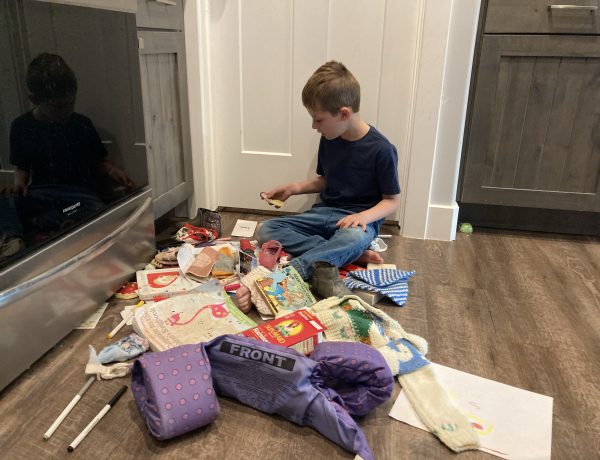Grief is a hard thing to feel. It doesn’t feel pleasant. You have lost something or someone that is very valuable to you. And there is nothing you can do to change it and get that person back into your life again.
For me, it is my son. He isn’t dead, but he is mentally not there. Sometimes I think his condition is worse than death because it means I have the pain of his loss but then I still have the huge task of taking care of his physical body every day. His physical needs are exhausting, but I don’t get the emotional reward of being able to connect with him, laugh with him, and talk with him.
Researchers say there are 5 stages of grief: denial, anger, bargaining, depression and acceptance. But what I didn’t realize was that these stages can be very cyclical. You don’t just go through these stages once and then you are done. You can go through these stages OVER and OVER again. Especially if you have what is called an ambiguous loss.
Ambiguous Loss
Ambiguous loss is where you have lost something in an unclear way. For example, if your child is lost or kidnapped. You are still hoping and praying that you will find them, but they might be dead. But you can’t move on because there is a chance that they are still alive. The loss is ambiguous. They are not physically present but they are mentally present because they still might be alive and you might get them back.
Ambiguous loss can also happen if your parent has Alzheimer’s. This time the parent is physically present but not mentally present. You have lost something but not in a clear way because the parent hasn’t died yet. You have lost the connection and relationship you had with the parent.
My ambiguous loss is my nonverbal autistic son. He is physically present in our lives, but he isn’t fully mentally present. I think it would have been easier to move on from this grief if he had died. If he had died, the grief would still be very hard and it would still probably resurface again and again on major holidays or life events. But if he had died, I would have at least been able to live a normal life with my other children. Instead, we have to care for my son every hour of every day and his constant care affects our entire life.
We aren’t able to do the things that most families take for granted. We can’t go on normal vacations. We can’t sit down and read a book when he is at home. He takes 100% supervision all the time. We can’t go to normal parties or family functions. We can’t enjoy holidays in the ways that most people do. The ambiguous loss affects every aspect of our daily living.
Another reason that a severely autistic child is an ambiguous loss is because it is unclear what his future will be like. No teacher can tell me if he will ever be able to learn how to talk. No one can tell me what he is capable of doing or not doing. And no one can tell me WHY this happened. So there is a lot of ambiguity that gets in the way of the normal grief cycle.

Things that trigger my grief
Usually I feel like I have accepted my life with my autistic son. It has been 5 years since he was diagnosed. I have mostly accepted that this is our life. We are different. We don’t have the same sort of life as everyone else, but that is okay. We don’t get to enjoy the same privileges as other people, but that’s okay. Hard things will make us stronger.
But every now and then things come up that trigger my grief. The most recent event was my friend coming to visit with her family. Normally you would that think a friend coming to visit for the weekend would be a happy thing. Not for me. It is a bold in-your-face reminder of what I don’t have. I don’t have a normal family. I don’t have normal kids that can entertain themselves, play together, and watch TV. So when I see this mother and father interacting with their normally developing children in my house for 12-14 hours straight during the day when they are visiting, something snaps within me. I feel all the hot anger again. And the anger eventually turns into depression. I have lost something – the chance to have a normal life with a normal family – and I can never get that back.
When my friend leaves with her family, things slowly go back to normal again. I take care of my kids. I do the housework. We live our life in the unique way that we HAVE to live because of my son’s issues. And I forget a little bit about how much easier the rest of the world with normally functioning children have it. I forget about how we are different and how every day is harder for us. But I know that when they come to visit again, I will mourn again. I will go through the cycles of grief again.

How do you process grief?
For me, processing grief means just feeling it. Crying. Being sad for a day or two until I have felt all the sadness enough that it moves on. But sometimes the sadness doesn’t move on. Sometimes it stays for a long time. But I don’t want to be sad forever, so how do I get over it?
I’ve found that one of the best ways to succor your sadness is to look outside of yourself and start serving others. Once you know what it is like to be truly depressed and have experienced great loss, you can actually be the best person to comfort others when they lose things as well. You can sit there and cry with others. You can listen as they talk about their grief and negative emotions. You can be the one who doesn’t judge but just loves. Because you have been there too.
Therapy also helps this process. A therapist can give you the chance to talk about all the nuances of your grief. Talking about it can often help you process it.
Another way to process grief is to give it over to Jesus Christ. He knows your every sorrow. He weeps with you when tragedies happen and your heart is breaking. I love to write out my prayers to Him. I write about all the things that I am sad about. And then I ask for His help. I read the scriptures and I find comfort in them. Often God talks to me through the scriptures – highlighting words or phrases and showing me how this certain verse relates to my plight. Jesus Christ can give you peace to replace the anguish and light to replace the darkness. But it doesn’t always happen right away. He wants you to develop those godly attributes of patience and diligence. So sometimes you have to wait for answers to come.
But the answers and peace will come. Just keep going. That is what I have learned the past few years.
Why do I have to grieve over and over again?
So, in answer to the beginning question – why do I have to grieve over and over again – I think the answer is because you have lost something super valuable to you. It’s okay to feel the grief repeatedly, especially if it is an ambiguous loss. It’s okay to never quite “get over it”. It’s okay for it to come up again and again. Just allow yourself to be sad for a few days. You don’t need to think that there is something wrong with you. Just feel the grief and remember that it is okay to be sad sometimes.





No Comments